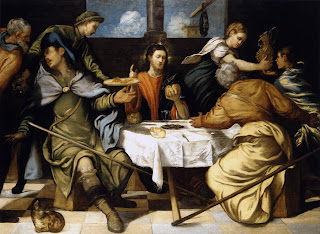cats.
So, since this is a subject near and dear to my heart, I am hereby inaugurating a "Cat word of the month" series.
And what better word to start with than "tabby". (OK, I'm biased.)
You might think this is a short form of the woman's name Tabitha, an Aramaic name meaning "doe", which was quite popular as a girl's name after the Reformation, thanks to it being the name of a woman restored to life by St Peter as recounted in Acts 9:36-41.
But while many would-be witty cat owners call their stripy moggies "Tabitha" (and I have to admit it is a very fine name for a cat), the word "tabby" has another source.
Way back when, there was a neighbourhood of Baghdad called ʿattābiy, renowned for producing striped silk taffeta. By the 1400s these fabrics were being imported by the French, who called them atabis or tabis. By the 1600s, the English, too, were using "taby" fabric. It was not long before the word was being applied to striped cats.
Interestingly, only English made this leap from striped silk to striped cats; most other European languages call them, well, "striped cats" or by their version of "tiger cat" (the Dutch intriguingly call them "Cypriot (cyperse) cats"). What the English called them in the Middle Ages, I do not know, as even the words "striped" and "stripy" are not found earlier than the Renaissance. One candidate is "brinded", (which later became "brindled") a word possibly related to the verb "burn".
Striped cats have clearly been around for a long time, and are often found in art from the Middle Ages onward.
In this depiction of the Supper at Emmaus by Tintoretto (1540), you can see a tabby cat in the lower left corner:

and here's one (possibly Papagena's distant ancestor?) being very cat-like in Bassano's depiction of the same scene from 1538. That snoozing dog had better watch out!
Next month we will look at the name for a particular type of tabby, the orange tabby or "marmalade" cat.
Frequent Wordlady readers know that in addition to being a word lover and a cat lover, I am also a ballet lover, so here is the famous "Pussycat pas de deux" from The Sleeping Beauty. If you love ballet, you might want to check out my upcoming season of fabulous ballet trips by clicking here.
Birmingham Royal Ballet - Puss in Boots divert from The Sleeping Beauty from Rob Lindsay on Vimeo.


From pigs to cats this is the Web site to get the lowdown.
ReplyDelete